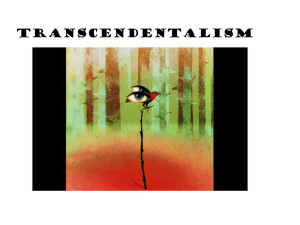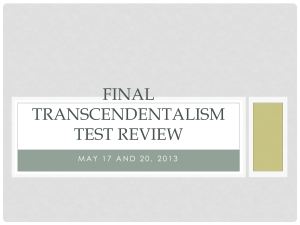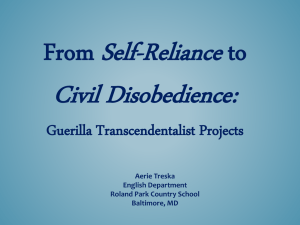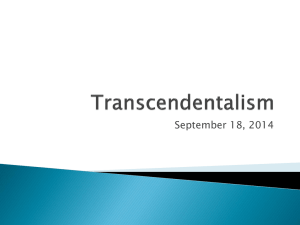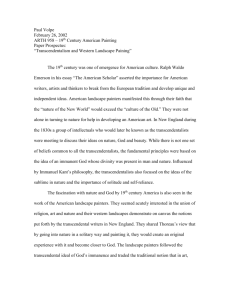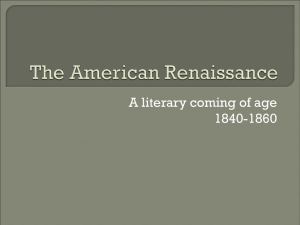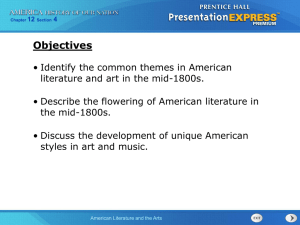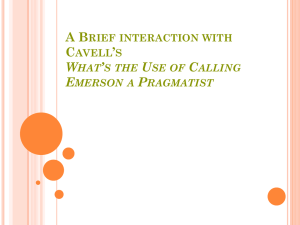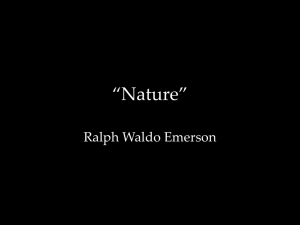transcendtalism - Course
advertisement
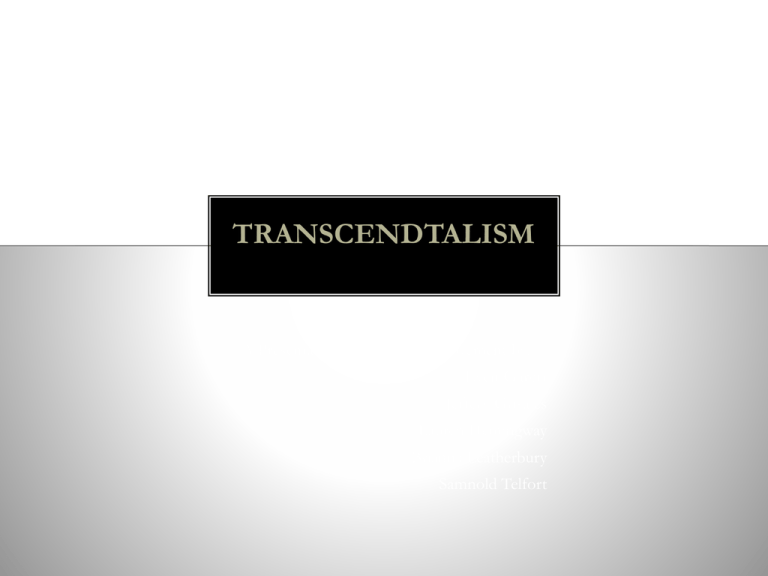
TRANSCENDTALISM A Presentation on the Poetic Movement by: Even Garcia Jeffery Grisales Lauren Hemingway Brianna Leatherbury Samnold Telfort BASIC TENANTS 1. Transcendentalism, essentially, is a form of idealism. 2. The transcendentalist "transcends" or rises above the lower animalistic impulses of life (animal drives) and moves from the rational to a spiritual realm. 3. The human soul is part of the Oversoul or universal spirit (or "float" for Whitman) to which it and other souls return at death. 4. Therefore, every individual is to be respected because everyone has a portion of that Oversoul (God). 5. This Oversoul or Life Force or God can be found everywhere - travel to holy places is, therefore, not necessary. 6. God can be found in both nature and human nature (Nature, Emerson stated, has spiritual manifestations). 7. Jesus also had part of God in himself - he was divine as everyone is divine - except in that he lived an exemplary and transcendental life and made the best use of that Power which is within each one. 8. "Miracle is monster." The miracles of the Bible are not to be regarded as important as they were to the people of the past. Miracles are all about us - the whole world is a miracle and the smallest creature is one. "A mouse is a miracle enough to stagger quintillions of infidels." - Whitman 9. More important than a concern about the afterlife, should be a concern for this life - "the one thing in the world of value is the active soul." - Emerson 10. Death is never to be feared, for at death the soul merely passes to the Oversoul. BASIC TENANTS (CONTINUED) 10. Death is never to be feared, for at death the soul merely passes to the Oversoul. 11. Emphasis should be placed on the here and now. "Give me one world at a time." - Thoreau 12. Evil is a negative - merely an absence of good. Light is more powerful than darkness because one ray of light penetrates the dark. In other words, there is no belief in the existence of Satan as an active entity forcing humans to commit immorality. Humans are good and if they do immoral acts they do so out of ignorance and by not thinking. 13. Power is to be obtained by defying fate or predestination, which seem to work against humans, by exercising one's own spiritual and moral strength. Emphasis on self-reliance. 14. Hence, the emphasis is placed on a human thinking. 15. The transcendentalists see the necessity of examples of great leaders, writers, philosophers, and others, to show what an individual can become through thinking and action. 16. It is foolish to worry about consistency, because what an intelligent person believes tomorrow, if he/she trusts oneself, tomorrow may be completely different from what that person thinks and believes today. "A foolish consistency is the hobgoblin of little minds." - Emerson 17. The unity of life and universe must be realized. There is a relationship between all things. 18. One must have faith in intuition, for no church or creed can communicate truth. 19. Reform must not be emphasized - true reform comes from within. HENRY DAVID THOREAU July 12, 1817 – May 6, 1862 BIOGRAPHY • Born David Henry Thoreau in Concord, Massachusetts. • Was close to his older brother John while growing up, who taught school to help pay for Henry's tuition at Harvard. He joined his brother after graduating in 1837 and taught as well. John’s unexpected death from lockjaw traumatized him. • The two years following his brother's death he worked with his father as a surveyor and making pencils. • As a young boy, he read his neighbor's (Emerson) book, Nature. Wanting to write his own book, he built a cabin on Emerson's land by Walden pond and moved there to experience nature. • Published second and most acclaimed book Walden, a detailed description of his experience in Walden, in 1854. • Died of tuberculosis in 1862 at the age of 44). He left behind, along with his two books and several essays, a journal that was later published in about 20 volumes. RALPH WALDO EMERSON May 25, 1803 – April 27, 1882 BIOGRAPHY • Born in Boston, Massachusetts, son of Ruth Haskins and the Rev. William Emerson, a Unitarian minister. His father died when Emerson was only was eight. • Attended Harvard College in October 1817 at the age of 14. • In 1829, he was ordained a minister of the Second Church in Boston and married Ellen Tucker soon after. In 1832 Emerson resigned from the church after his wife's death from tuberculosis, one of the many death’s affecting his life including: all three of his brothers and his older son at age five aside from his first wife. • Toured Europe in 1833 where he began to form his transcendentalist ideas. He returned to the United States as a lecturer soon after and later married Lydia Jackson; they lived in Concord and had four children. • Emerson befriended Thoreau in 1837 and later became his mentor. • Waldo died of pneumonia in 1882. Through deaths in the family, his house burning down, and struggles with his faith he found himself writing. SELECT LIST OF WORKS • Essays: First Series – 1841 Self-Reliance The Over-Soul Circles • Essays: Second Series – 1844 Experience The Poet • Nature; Addresses and Lectures – 1849 • Representative Men – 1850 • The Conduct of Life (Culture and Fate) - 1860 Individual Essays • Nominalist and Realist • English Traits - 1856 • Society and Solitude – 1870 Poems • Concord Hymn – 1837 • The Rhodora – 1847 TRANSCENDENTALIST APHORISMS Transcendentalists' aphorisms are based around many themes such as wealth, knowledge, wisdom and friendship. Thoreau and Emerson, have left behind many of these aphorisms. "Heaven is under our feet, as well as over our heads." – H. D. Thoreau This aphorism deals with wisdom. Thoreau says that, yes, heaven is over our heads, but it is also under our feet. By this he means that even while being on this Earth, this land, we are still in heaven. Where we live and how we live, it is what we know as life and in a way can be considered "heaven". "We all boil at different degrees." – R. W. Emerson Emerson here deals with behavior and the different reactions that people will have to different (or some of the same) situations. A man might go ballistic over misplacing his pocket watch, while another might calmly look to the sun for an answer. Sources • Larkin, Jack. Historical Background on Antislavery and Women’s Rights 1830-1845. Teach US History, 2011. http://www.teachushistory.org/second-great-awakening-agereform/articles/historical-background-antislavery-womens-rights-1830-1845. 1 April 2012 • Reuben, Paul. American Transcendentalism: A Brief Introduction. PAL: Perspectives in American Literature, 2011. • Sugg, Allan. Transcendental Legacy. American Transcendentalism Web, 1999. http://www.vcu.edu/engweb/transcendentalism/roots/legacy/sugg.html. 1 April 2012 • Tran, Genevieve. What happens to chivalry once women are "equal" to men? TED Conversations, 2011. http://www.ted.com/conversations/1770/what_happens_to_chivalry_once.html. 1 April 2012 • Biography of Susan B. Anthony. Susan B. Anthony House, 2009. http://susanbanthonyhouse.org/her-story/biography.php. 1 April 2012. • Henry David Thoreau. Transcendentalists, 2009. http://www.transcendentalists.com/1thorea.html. 1 April 2012 • Ralph Waldo Emerson. The Literature Network, 2012. http://www.onlineliterature.com/emerson/. 1 April 2012
